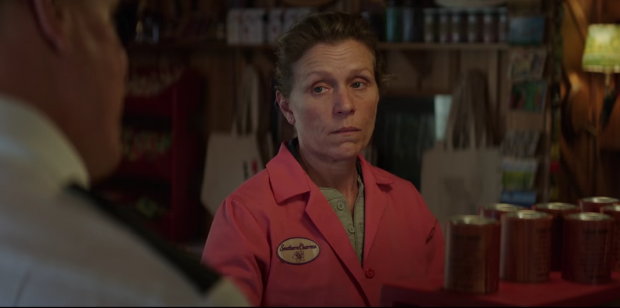
Three Billboards Outside Ebbing, Missouri is a movie that asks the audience to see the moral equivalence between the vengeful woman whose daughter was raped and killed and a racist, homophobic police officer guilty of appalling acts of violence shown onscreen. It also wears the trappings of a comedy, donned when Martin McDonagh thinks matters are too serious for his imagination to explore. This is the M.O. of the director of In Bruges, a potty-mouthed comedic thriller that also reveled in tonal variances. But Three Billboards, his most ambitious project to date, requires the powers of a Renoir or a Shakespeare to integrate the yuks and the tears.
In a performance steely enough to deserve a film that would do it justice, Frances McDormand plays Mildred Hayes, who puts $9000 down in cash for the titular billboards on the highway outside her Missouri town; against a stark blood-red background, the text implicitly accuses Sheriff Bill Willoughby (Woody Harrelson) of dragging his feet on the murder case. While upset, Willoughby knows Mildred has done nothing illegal. Besides, pancreatic cancer has reframed his priorities. For Jason Dixon (Sam Rockwell), however, this won’t do. This police officer, in whose custody a man died from possible torture, begins a series of intimidations: arresting Mildred’s friend and co-worker at a souvenir shop for minor marijuana violations; harassing Red (Caleb Landry Jones), the young man who sold Mildred the ad space. As if these outrages weren’t enough, Mildred has to endure the sight of her ex husband (John Hawkes) around town with the nineteen-year-old girlfriend Penelope (Samara Weaving, directed to play a hick in one of the film’s nail-on-chalkboard moments).
Reading the synopsis would suggest McDonagh adapted a Dennis Lehane novel. What’s onscreen is a bizarre amalgam of the broad, the cute, and the gory. A couple of sequences are shot in slo-mo. Close-ups of a dying roach on a window sill. Red reading Flannery O’Connor. As fellow officers react to terrible news about a colleague, Dixon is in the foreground, enraptured by ABBA’s “Chiquitita” (the film hints at Dixon’s sexuality – he’s a bachelor living with a chain-smoking Southern gothic mama – without going there). Mildred has conversations with a doe that hesitantly approaches a billboard and, later in the picture, with a pair of bunny slippers. But the McDonagh specialty is allegedly comic violence, therefore we’re treated to the sight of a dentist drill boring into a thumbnail (in extreme close-up, of course), Dixon punching a woman in the face after he’s beaten another character to a pulp and hurled him out a window, and, in a gesture toward gender equality, Mildred gut-punching a female high school student. Joan Baez’s version of “The Night They Drove Old Dixie Down” soundtracks a scene where a certain character hurls Molotov cocktails at a certain building – indeed, most of Three Billboards‘ musical cues are misconceived, including the way Carter Burwell’s score drops in for discordance or inapposite underlining.
To appreciate Three Billboards means getting on board for McDonagh’s attempt at a rural American Winter’s Tale: a story in which forgiveness tempers hatred and revenge. In McDonagh’s film the drama rests on whether Willoughby’s conviction that despite the race-baiting, hair-trigger temper, and fag jokes there’s a good cop in Dixon worth saving. For a while the ferret-eyed Rockwell isn’t bad at Dixon; police work in a small town consists of a bunch of double takes for this doofus. But McDonagh overdoes the Rufus Cornpone parts of his character such that responding to his sadism is a problem: we’ve seen too much of this sociopath’s imbecility to take the sadism seriously yet we can’t laugh off the graphicness – the gratuitousness – when it comes. By threading the needle with Mildred’s own determination to risk life and property for the sake of her vendetta, McDonagh’s script argues that Dixon and Mildred are twins, reflected in a dark mirror; at the end of the film each understands the other. This development is, in a word, ghastly. Doubtless, a grieving mom who resorts to violence needs sympathetic help, therapy, anything; suggesting that she and the cop who was a member of the armed bureaucracy that couldn’t solve the murder would benefit from rubbing against each other is to open a moral chasm. Not helping McDonagh’s cause is the manner in which he introduces a trio of exemplary black citizens who, off the Sidney Poitier assembly line, underscore the pettifoggery of white-on-white conflict.
The last scene is particularly chilling. I won’t describe it as anything but a chicken shit toying with vigilantism under the guise of a road movie. If anyone in the audience needed the film equivalent of one of those myriad NYT features published since November 2016 in which small town Americans commingle economic anxiety and racism – because both liberals and conservatives were tired of the establishment! – then Three Billboards Outside Ebbing, Missouri is for them.
GRADE: C-

Excellent piece, Alfred, but your lenient grade surprised me. I give the movie a “G.”
McDormand’s work is its only virtue.